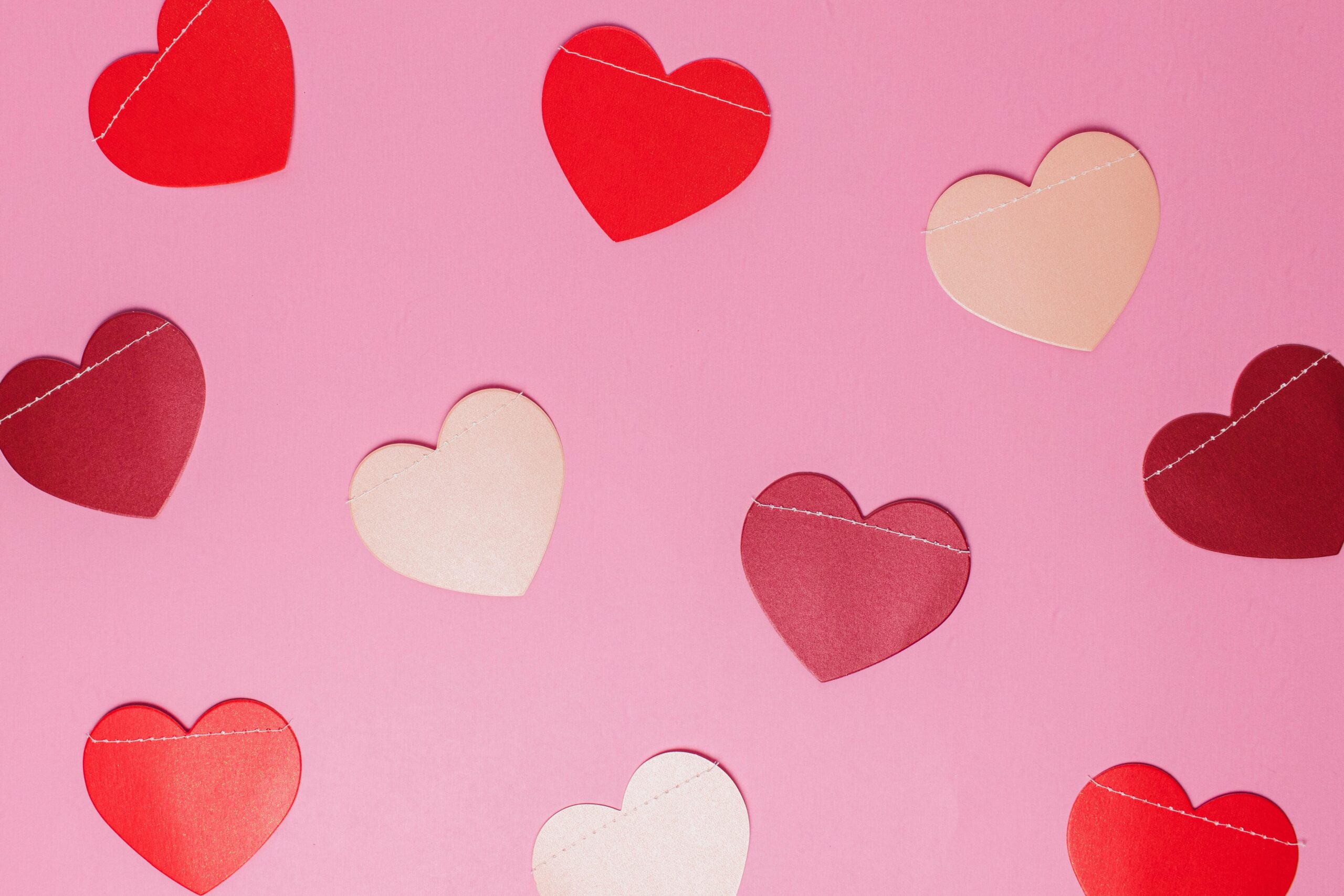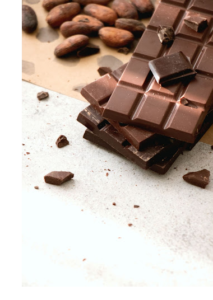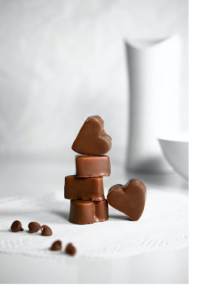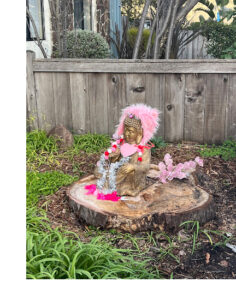Will You Be Your Valentine? Gifts for Cultivating Self-Love
posted by Martha Krausz/ February 14, 2023

 When I was in college studying Virginia Woolf among the Jersey-cowed fields of rural Massachusetts, my mother would send me boxes of See’s Candy. In February, the black and white checkers would brighten into red cushioned hearts, holding an assortment of dark and milk nuts, truffles, and chews. Reaching into the mailbox to upright the slanted heart, I would hear the crimped paper cups slide back into place. From Mama Bear, to my Mouse the card read. Each year, I would take my Valentine treasure to the library to share its contents with my friends. First, though, I would claim the dark chocolate almond clusters for myself—my personal favorite. I love how they look like a single piece, but are really an amalgam, made of many parts, each almond held together by the sweet, encapsulating brown of cocoa, cream.
When I was in college studying Virginia Woolf among the Jersey-cowed fields of rural Massachusetts, my mother would send me boxes of See’s Candy. In February, the black and white checkers would brighten into red cushioned hearts, holding an assortment of dark and milk nuts, truffles, and chews. Reaching into the mailbox to upright the slanted heart, I would hear the crimped paper cups slide back into place. From Mama Bear, to my Mouse the card read. Each year, I would take my Valentine treasure to the library to share its contents with my friends. First, though, I would claim the dark chocolate almond clusters for myself—my personal favorite. I love how they look like a single piece, but are really an amalgam, made of many parts, each almond held together by the sweet, encapsulating brown of cocoa, cream.
 Love, like chocolate, is a connecting, encapsulating force. It is a medium that can soften, melt, and shapeshift to our many curves, edges and parts. Love—among family members, friends, partners —is also a stanchion, a strong and supportive structure that can solidify, and strengthen bonds between us, cohere the diverse members of our world that might otherwise roll or crumble apart.
Love, like chocolate, is a connecting, encapsulating force. It is a medium that can soften, melt, and shapeshift to our many curves, edges and parts. Love—among family members, friends, partners —is also a stanchion, a strong and supportive structure that can solidify, and strengthen bonds between us, cohere the diverse members of our world that might otherwise roll or crumble apart.
Love, like chocolate, is a gift we can give to ourselves and others; to be enjoyed interpersonally and intrapersonally. I’m talking about SELF-LOVE, The Body Positive’s second core Competency, and Valentine’s Day’s quieter invitation, tucked behind/inside the louder commercial messages of romance.
When we talk about self-love, we refer to (core) self energy—the calm, compassionate, connected space inside us that can be blocked at times by trauma, stress, and big or small burdens, but that always exists, and from where guidance, wisdom, and intuition emanate.
Thich Nhat Hanh defines Self love as, “Loving kindness, compassion, joy and freedom.” Self-love is less an object or part we contain, than a space that we truly are, full of patience, wisdom, compassion, curiosity. Of course, self-love can be eclipsed at times by other parts (fear, worry, anger, sorrow), just as the moon or sun’s light can be eclipsed by another planet or rain cloud, or how chocolate can sometimes be lost to competing flavors in a sundae.
In the Be Body Positive Fundamentals Home Study Course Connie reminds us, “You’re not gonna love yourself all the time. Part of harnessing and practicing self love is knowing that this is a journey of trial and error and progress. Of making mistakes and being imperfect, including imperfection on your self-love cultivation.”
 Yet, on this imperfect journey, the force of self-love never disappears; and when you do access it, it need not be trained to do its job. Whereas many traditions teach us that we have to build up the muscle of compassion and love, The Body Positive Model (and the Internal Family Systems model) believes that self-love exists in you at all times. It may be trapped behind a wall of robust coping mechanisms, critical voices (doing their best to keep you safe in the way they have learned), but self-love is always beyond the wall, alive, well, waiting, ready. In his latest book, No Bad Parts, Richard Schwartz writes, “the Self is already buff with compassion. It merely needs to be released, not strengthened.” You don’t need to take your self-love to the gym to learn the practice of sself-love this Valentine’s Day, or any day. All you need to do is learn to trust it.
Yet, on this imperfect journey, the force of self-love never disappears; and when you do access it, it need not be trained to do its job. Whereas many traditions teach us that we have to build up the muscle of compassion and love, The Body Positive Model (and the Internal Family Systems model) believes that self-love exists in you at all times. It may be trapped behind a wall of robust coping mechanisms, critical voices (doing their best to keep you safe in the way they have learned), but self-love is always beyond the wall, alive, well, waiting, ready. In his latest book, No Bad Parts, Richard Schwartz writes, “the Self is already buff with compassion. It merely needs to be released, not strengthened.” You don’t need to take your self-love to the gym to learn the practice of sself-love this Valentine’s Day, or any day. All you need to do is learn to trust it.
Of course, there are things you can do to help clear the path for self-love. Rituals like meditation, breathwork, and embodied movement (e.g., yoga, walking meditations, etc.) can be wonderful tools to help your internal system learn to trust and surrender to love. We have linked a self-love meditation at the end of this blog to help you invite self-love and self-compassion into your body today.
Please know that opening yourself up to self-love in this meditation doesn’t mean pushing away the feelings and thoughts that are not love (e.g., fear, sadness, depression, worry, anxiety, fear, anger). A self-love practice simply invites you to ask these parts to allow you some breathing space, to access the loving, compassionate self energy that already surrounds them, like the cytoplasm surrounding a cell’s contents, or the creamy chocolate surrounding and holding the almonds in my favorite treat.
Self-love is not selfish. By helping yourself open up to and cultivate self-love inside yourself, you are not escaping but rather actively partaking in the collective project of interhuman connection and healing.
Elizabeth Scott claims, “Being able to be kind to ourselves is the resource that makes it possible to be kind to others.” Outwardly focused love and self-love are parallel structures, like the stacks of a Russian doll. Interpersonal love nourishes and holds our community together, and self-love supports and nourishes the individuals that form that community. More, these macro and micro (other/self) layers reflect and shape each other. When I bake, I taste my goods—I enjoy them first. Receiving and soaking up self-love is how we learn to be stronger, more attuned love-givers. As within, so without, the adage goes. More comprehensively How we treat parts in ourselves, I’ve noticed, is how we approach them in the world. (Richard Schwartz) When we hold ourselves with love, we can extend this gift to others.
On those chocolate-fueled study nights, I would instruct my friends, peering wide-eyed into the box: If you don’t like your first bite, put it back! My mother’s intuitive eating mantras from my high chair days spilled forth. The idea of someone forcing a chocolate out of politeness physically hurts me in the way that seeing a dog get yanked by its collar across a street hurts.
The Body Positive offers the following resources to you today with a similar generosity and non-attachment. Taste it, try it. If you like it, seize it, it is yours. If you don’t, simply put it back. Trust the taste buds of your intuition. This discernment, itself, is a form of self-love.
I suggest you read the whole of Mary Oliver’s “To Begin With, The Sweet Grass” But I will leave you with her last lines:
And what do I risk to tell you this, which is all I know?
Love yourself. Then forget it. Then, love the world.
Resources:
- A free meditation to help you cultivate — in your body.
- A poem by Mary Oliver, “To Begin With, The Sweet Grass”
- A link to a personal essay by Melissa Febos,“The Wild, Sublime Body.”
- A link to the Be Body Positive Fundamentals Home Study Course
- A link to a synopsis & excerpt of Richard Schwartz’s latest book, No Bad Parts
